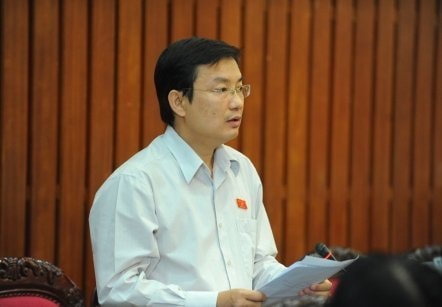National Assembly deputies propose to include sovereignty declaration in the Constitution
Careful research is needed to include the sovereignty claim of Hoang Sa and Truong Sa in the Constitution -Deputy Pham Trong Nhan (Binh Duong) spoke at the discussion session on the draft amended Constitution at the National Assembly.

Deputy Pham Trong Nhan
Mr. Nhan emphasized:With the indomitable will of the Vietnamese people, I have the firm belief that the next generations will fulfill our declaration today that the territorial integrity and sovereignty of Vietnam are immortal and inviolable.
Many civil rights have not been legalized.
The delegates also contributed many opinions on ensuring human rights and citizens' rights in the Constitution and the issue of power control.
Delegate La Ngoc Thoang (Cao Bang) pointed out that the Constitution must have a mechanism to protect human rights and basic rights of citizens.
"Right in the preface of the 1946 Constitution, drafted by President Ho Chi Minh, it was affirmed: The National Assembly's drafting of the Constitution is authorized by the people, the amendment of the Constitution is requested by 2/3 of the National Assembly, but changes approved by the National Assembly must be submitted to a national referendum.", so the whole people decide the Constitution, the state does not issue the Constitution for the people, Mr. Thoang said.
However, no matter how good the expression of popular power is, protecting that power in practice is decisive."In fact, in the 1992 Constitution, there are many direct rights of the people such as the right to information, freedom of assembly, speech, demonstration and indirect democratic rights such as dismissal and no-confidence that have not been specified by timely laws.", Cao Bang delegate commented.

Delegate La Ngoc Thoang: Many direct and indirect democratic rights of citizens are not specified by timely laws.
Lawyer Truong Trong Nghia (HCMC delegate) said, "If the 1992 Constitution amendment does not further promote freedom and democracy, and focus on synchronous political and economic innovation, thereby creating stronger momentum for the new revolutionary stage, then it should not be amended in small ways."
Mr. Nghia proposed to affirm that "citizens have the right to hold a referendum on important national issues and on constitutional changes" as a fundamental right as in the 1946 Constitution.
Delegate Nguyen Dinh Quyen (Hanoi) proposed that the Constitution affirm that the right to property ownership is sacred and inviolable."The constitutions of many countries have stipulated this issue and this is a consistent idea to determine the relationship between the state and citizens, related to the issue of property ownership.", Deputy Chairman of the Judiciary Committee said.
Mr. Quyen also proposed that the Constitution elevate land use rights from the Civil Code to stipulate that land use rights are property rights."This issue has been regulated in the Civil Code, but if it is regulated in the Constitution, it will be one of the guiding channels for policy making related to land issues.".
Also on land, Director of the Institute for Legislative Studies Dinh Xuan Thao (Hanoi Delegate) noted that the amendment of the Land Law is being carried out in parallel with the amendment of the Constitution, which has "differences in land recovery regulations".
"The draft amended Constitution stipulates that land can only be reclaimed in three cases for reasons of national defense, security or national interests. But the draft amended Land Law stipulates two more reasons: the purpose of developing public interests and conditions for socio-economic development.", Mr. Thao pointed out.
"We must unify because although these two documents go hand in hand, the Land Law is expected to be passed in May next year, while the Constitution is due in November. If the Land Law has 5 cases of land recovery, then the Constitution only has 3, it will be very difficult to handle.", Director of the Institute of Legislative Studies commented.
Concretize "using power to control power"
The deputies also contributed many ideas so that the Constitution ensures the spirit and requirements of "unified state power with division, coordination and control of power among legislative, executive and judicial agencies".
Deputy Tran Dinh Nha (Thua Thien - Hue) commented:"The Resolution of the 11th Party Congress especially emphasized the principle that power must be controlled, and power must be used to control power. Unfortunately, in the draft amendment to the 1992 Constitution, this principle has not been strongly implemented."
Delegate Do Van Duong (HCMC) said that there must be a mechanism to control state power "so that the State must do correctly and fully what the people have authorized".
Mr. Duong proposed to add a regulation to show the control of power within each power system. The Ho Chi Minh City delegate also wants to add the right for the National Assembly to decide on the structure of the number of government members to increase the number of full-time deputies, to be more independent and objective in reviewing reports, voting on projects submitted by the government, and questioning and criticizing government members.
According to Deputy Do Van Duong, the National Assembly also needs more tools to control the implementation of executive and judicial powers, such as the Interim Committee, to study and examine a project or investigate serious violations in state-owned corporations and groups.
The HCM City delegate also shared the opinions on establishing an independent State Audit as many delegates have raised. Deputy Chief Justice of the Supreme People's Court Tran Van Do (Delegate from An Giang) said that the State Audit should be under the National Assembly.
The State Bank should also become a central bank under the National Assembly as many countries have done, to avoid the situation where many decisions in monetary and credit policies, and very large and especially large expenditures are made but the National Assembly does not know.
According to Vietnamnet-M






